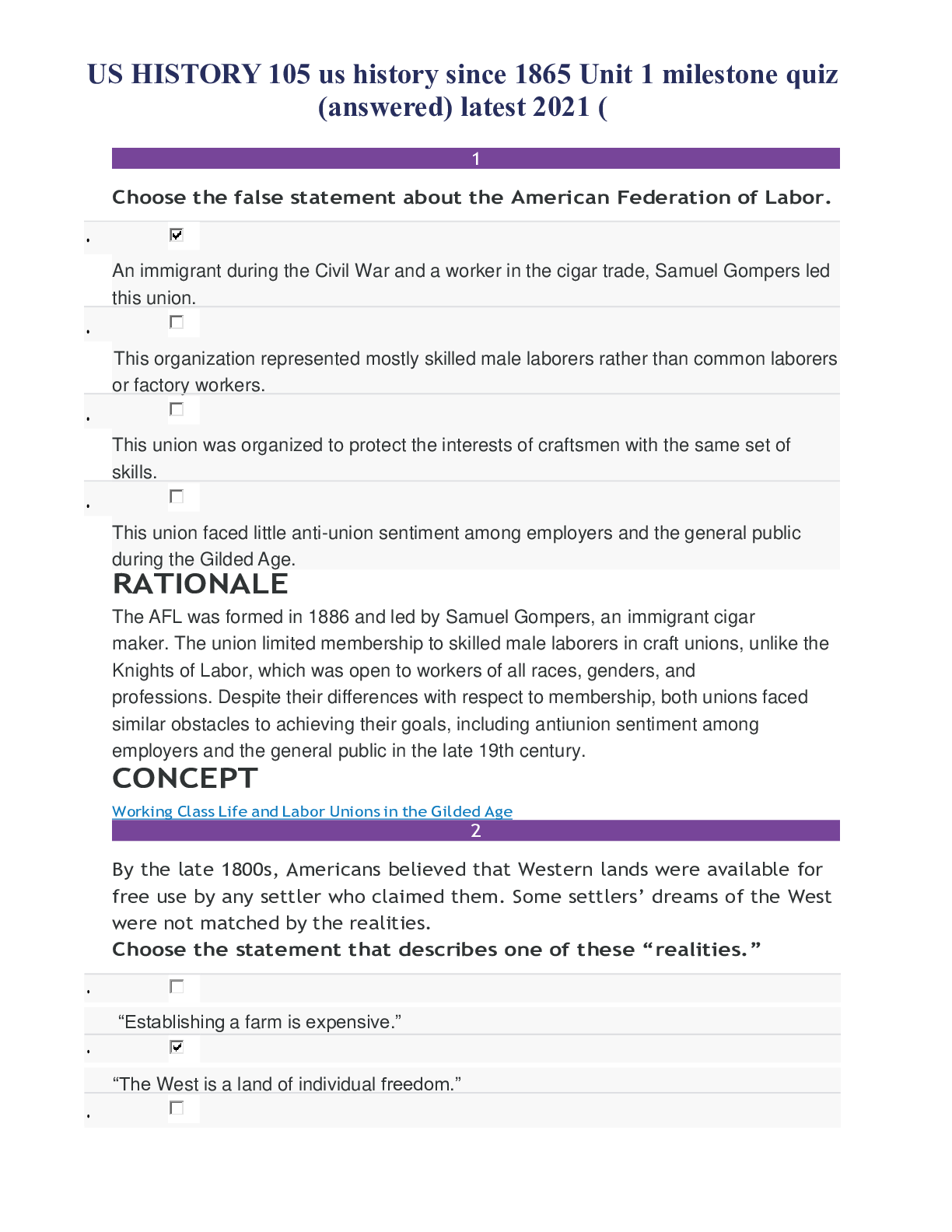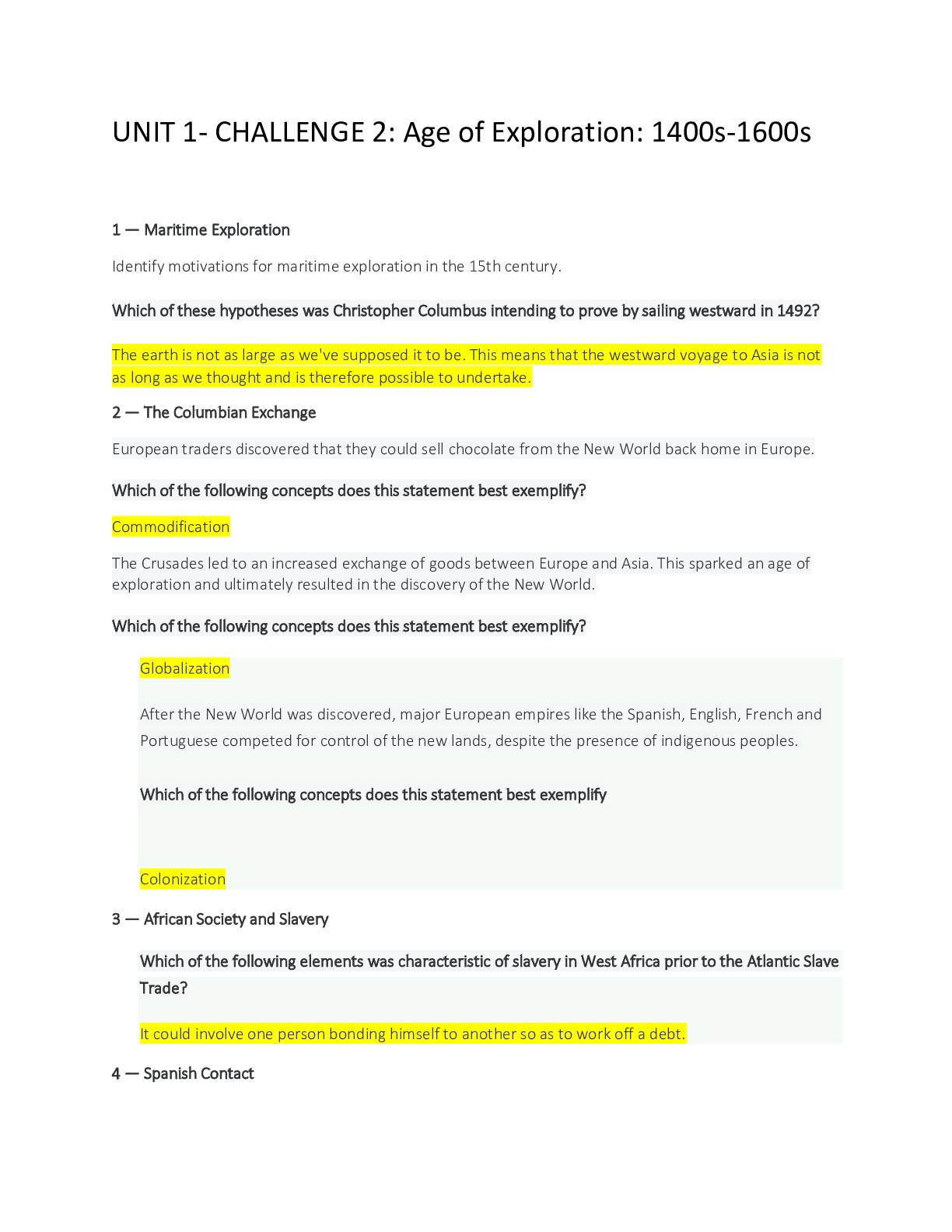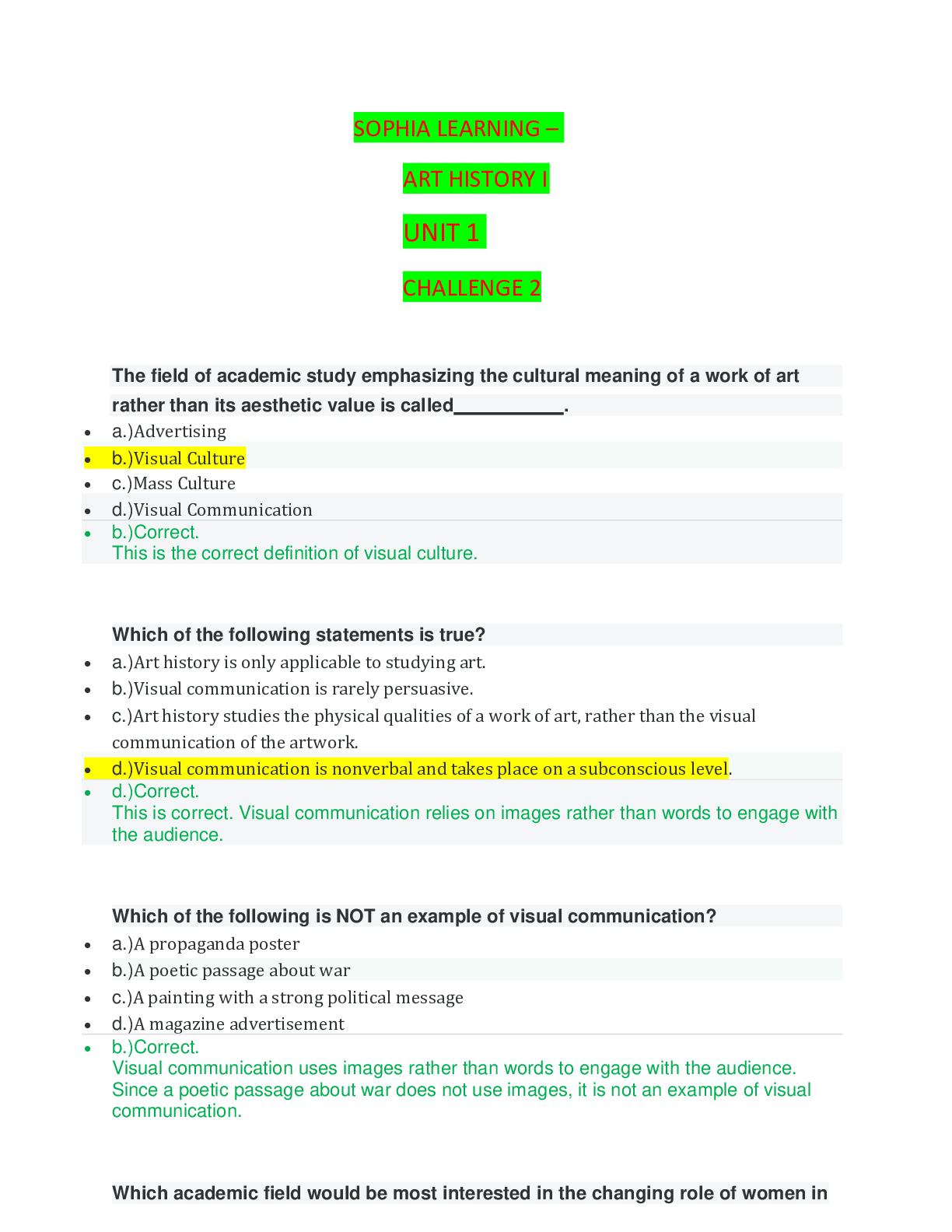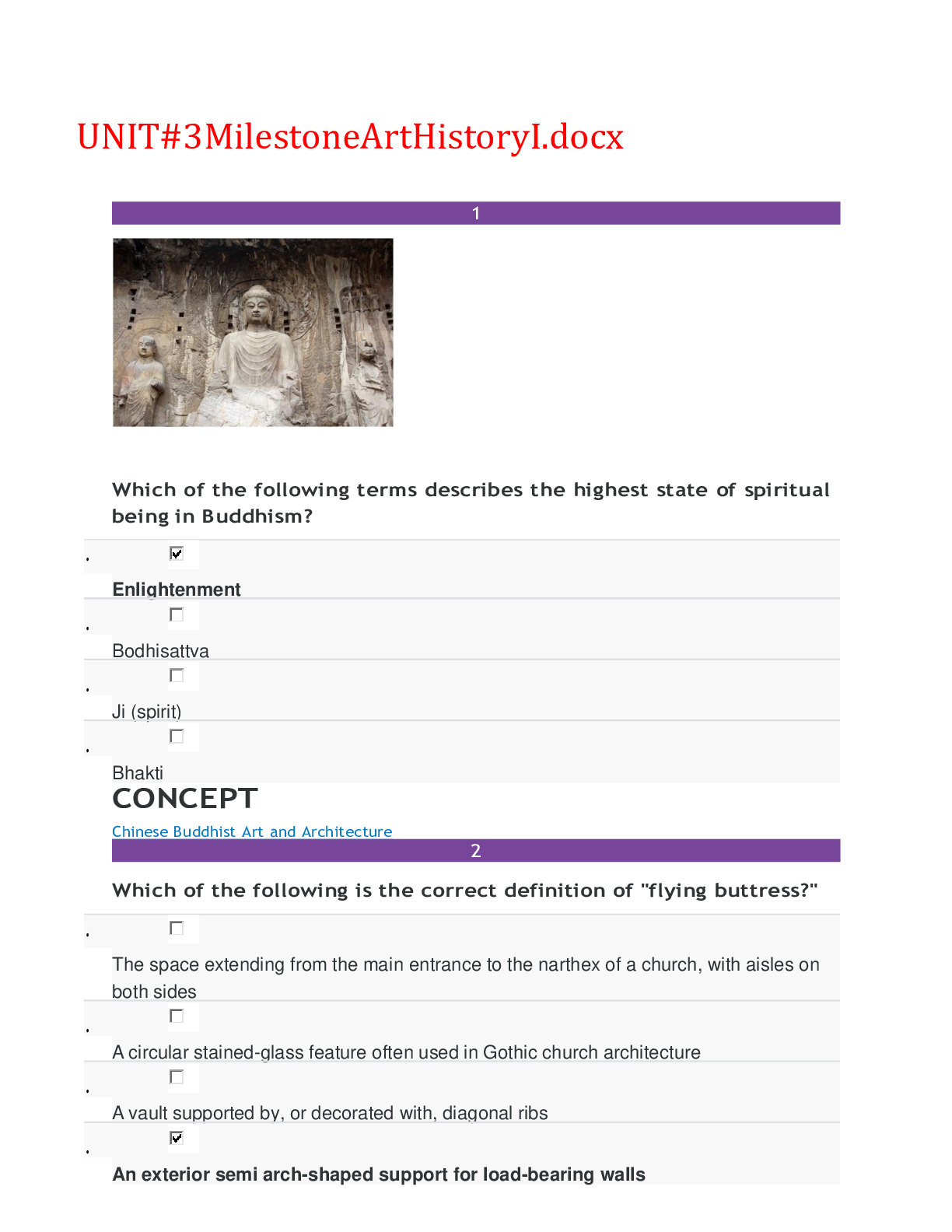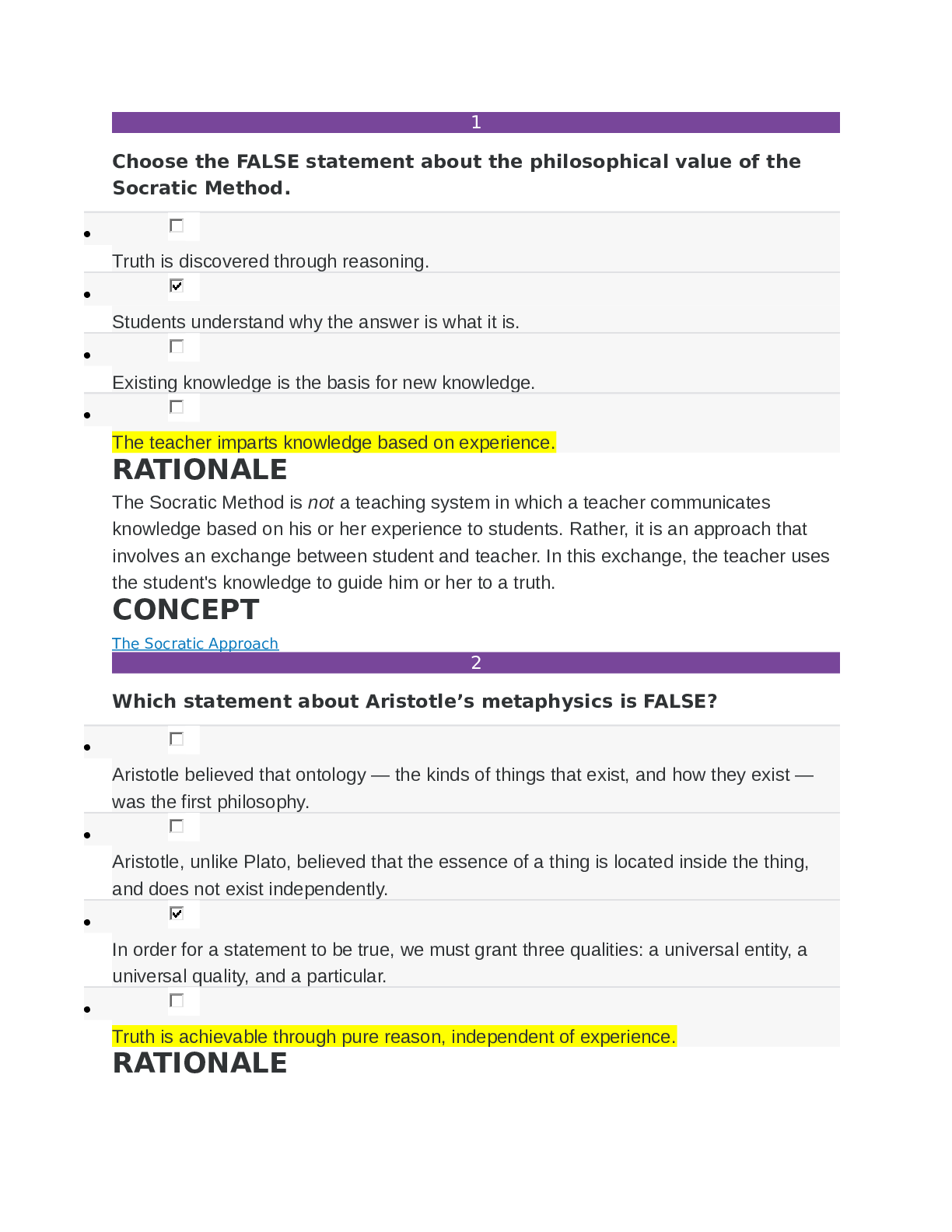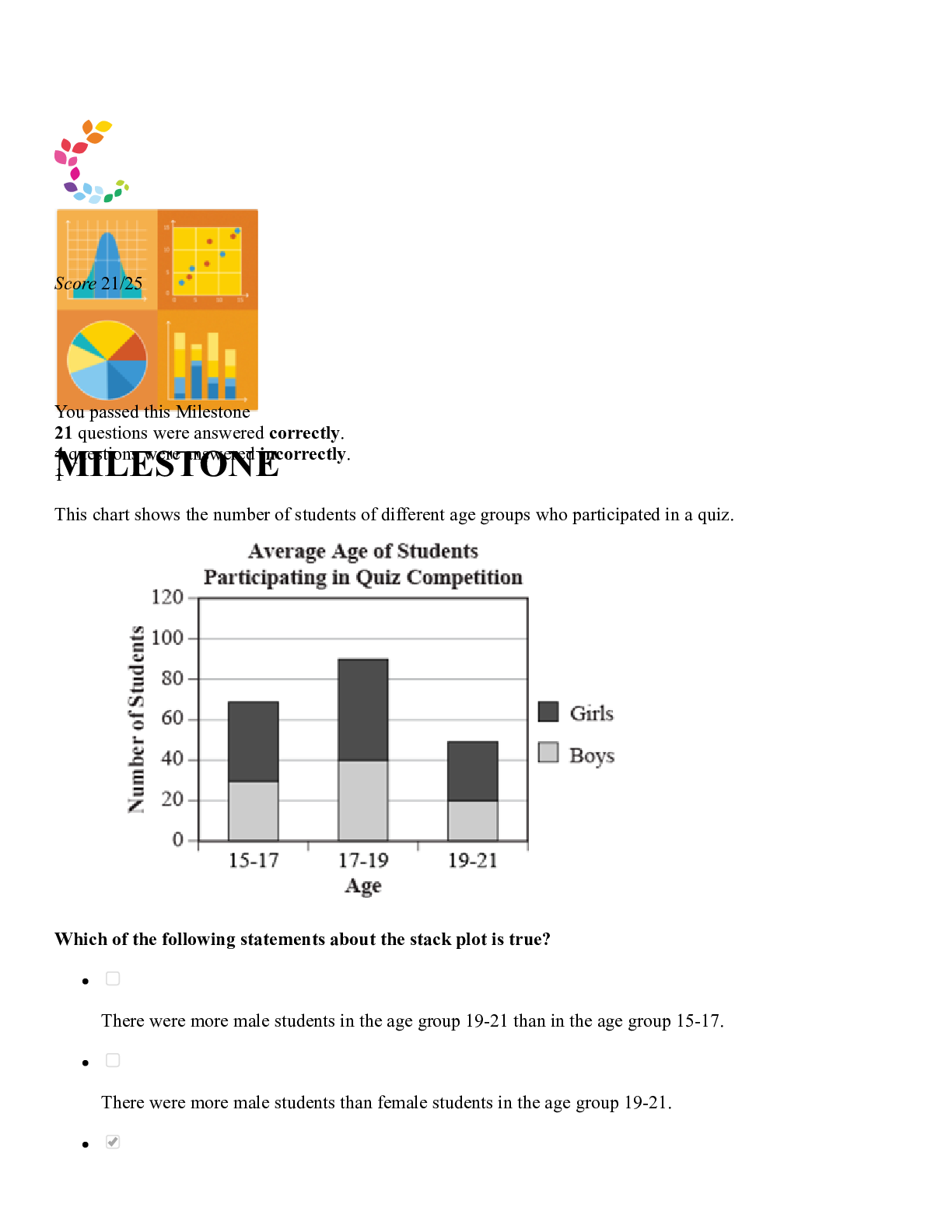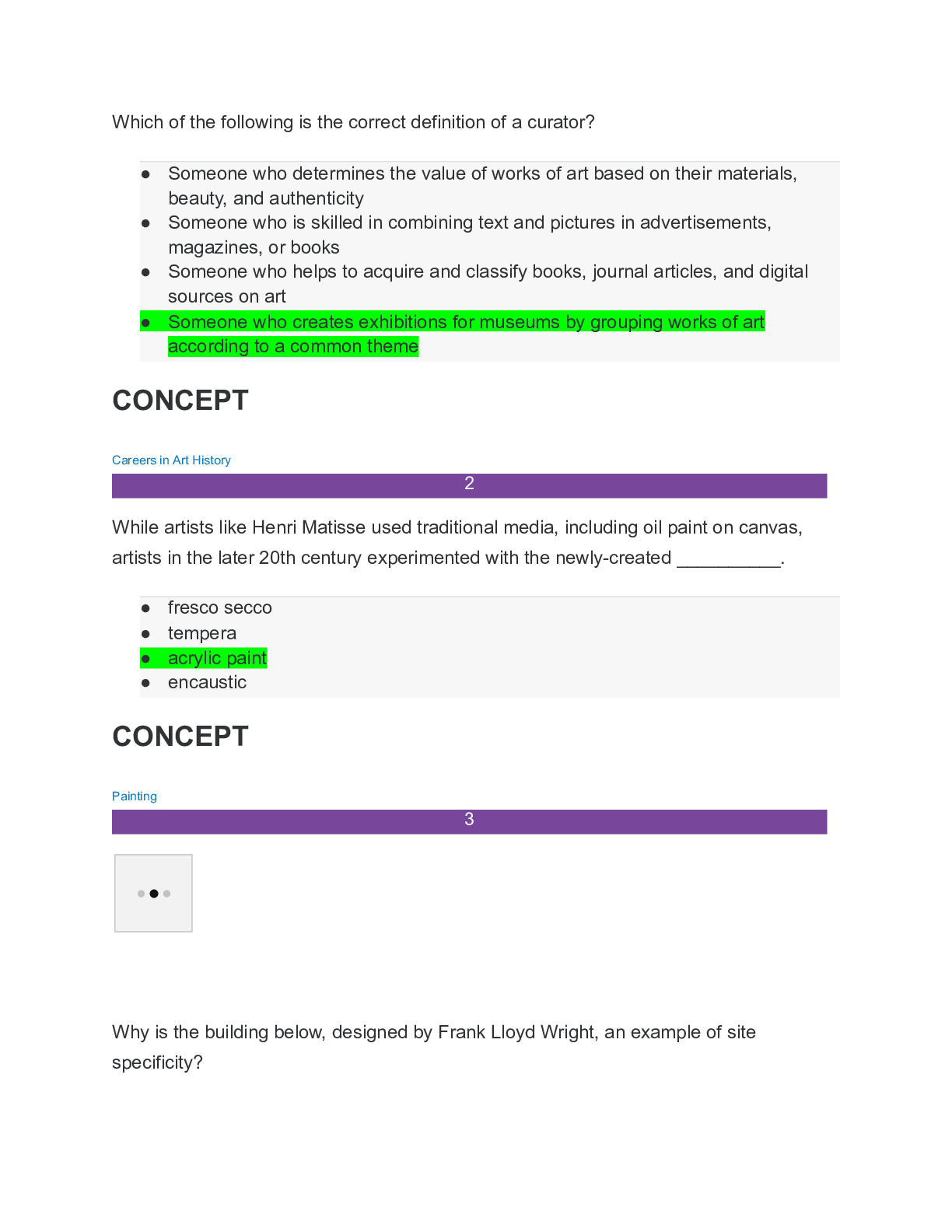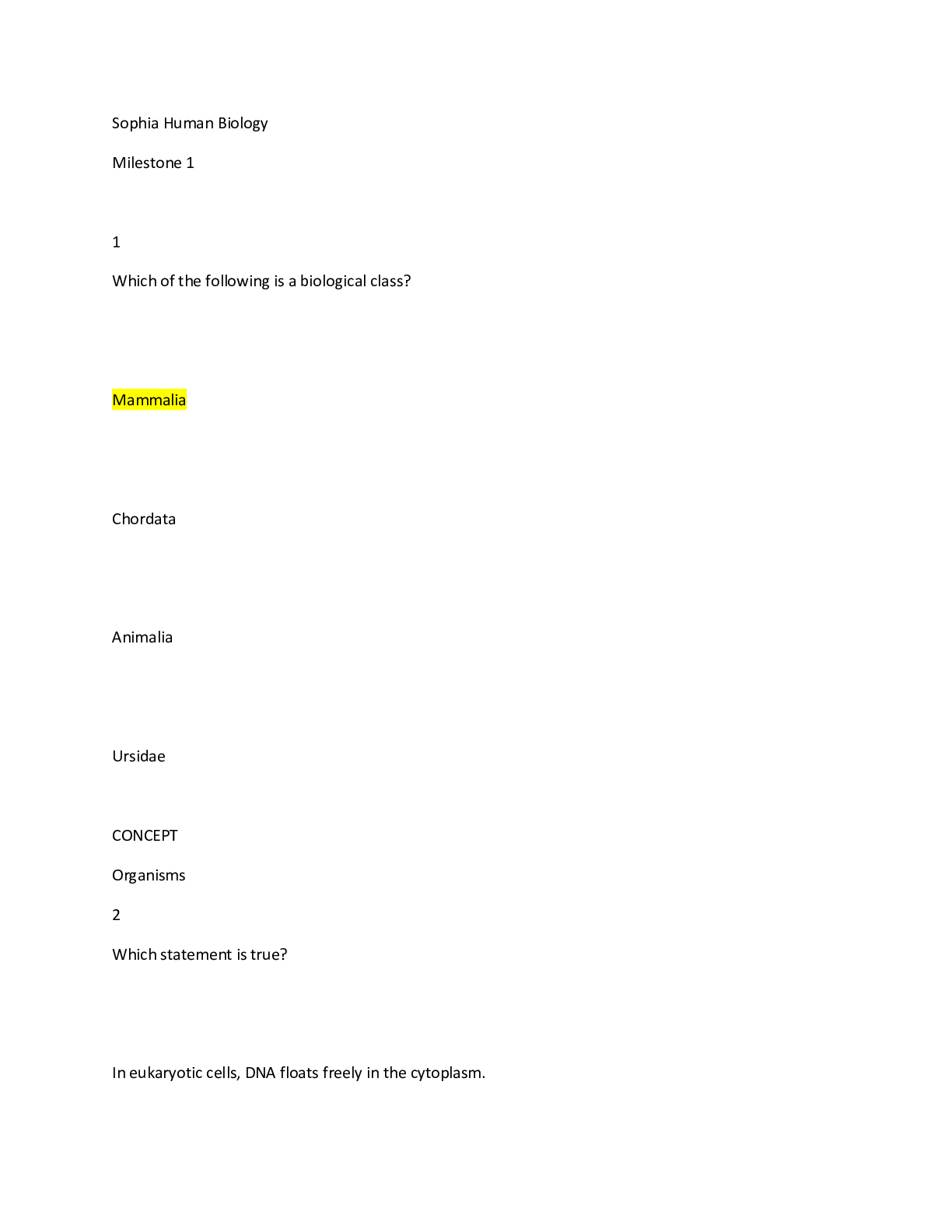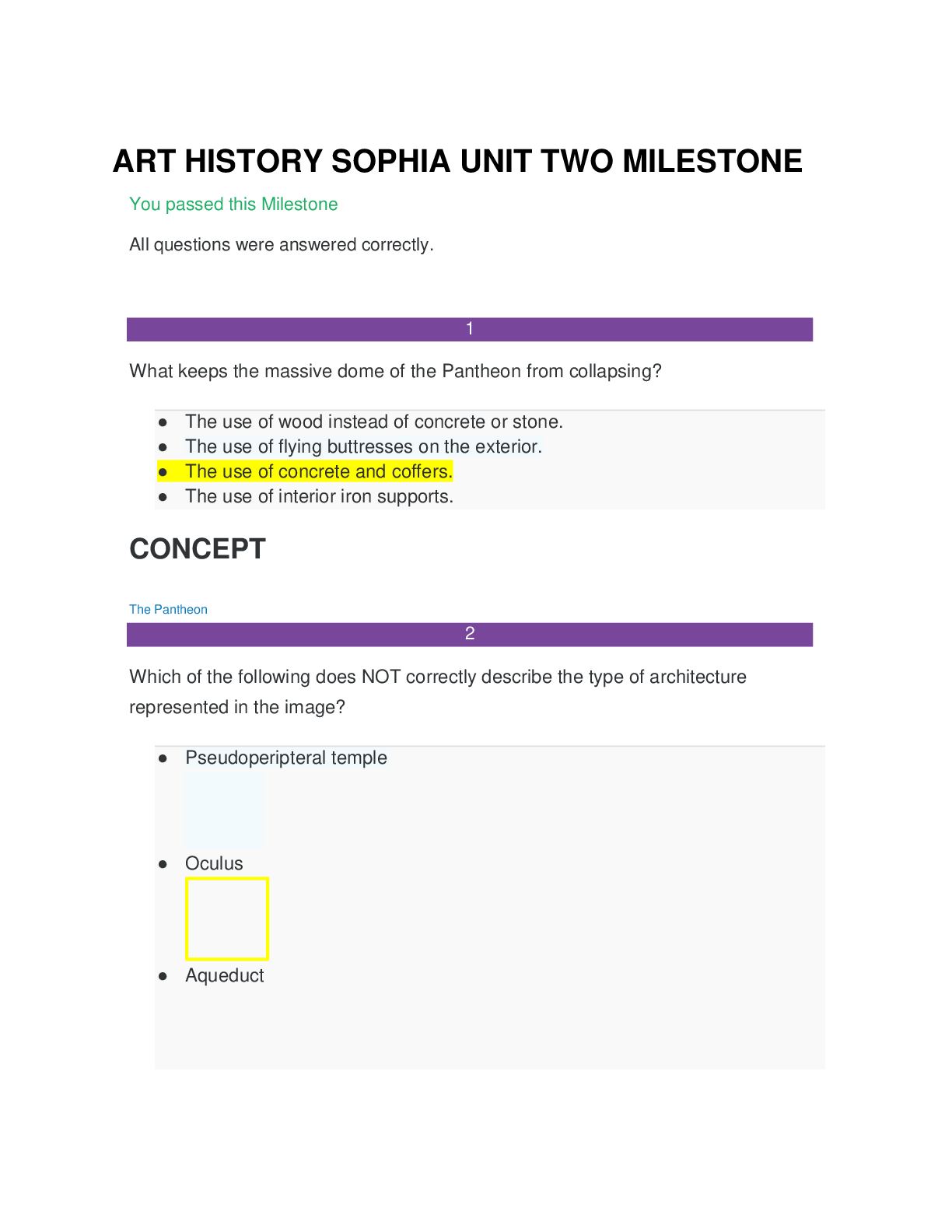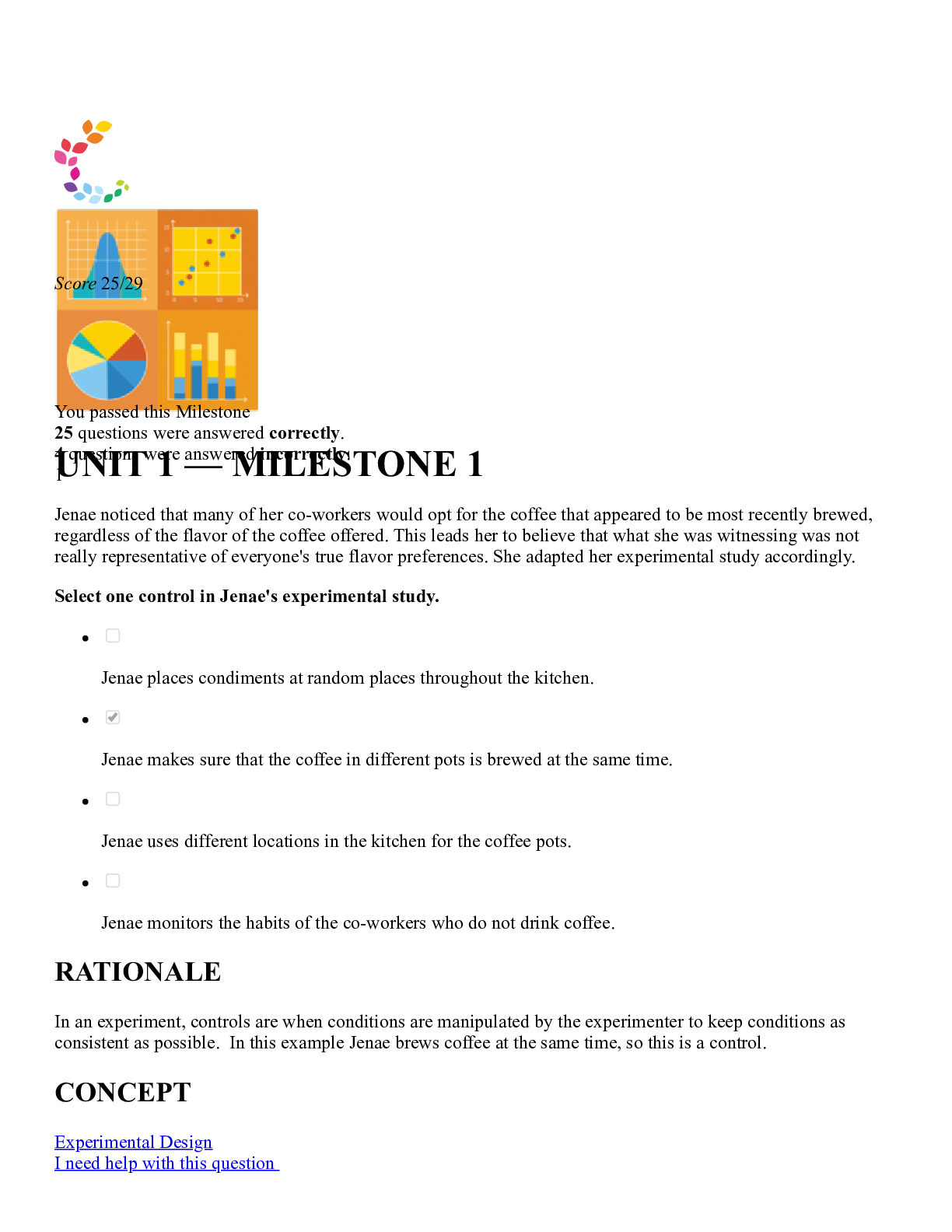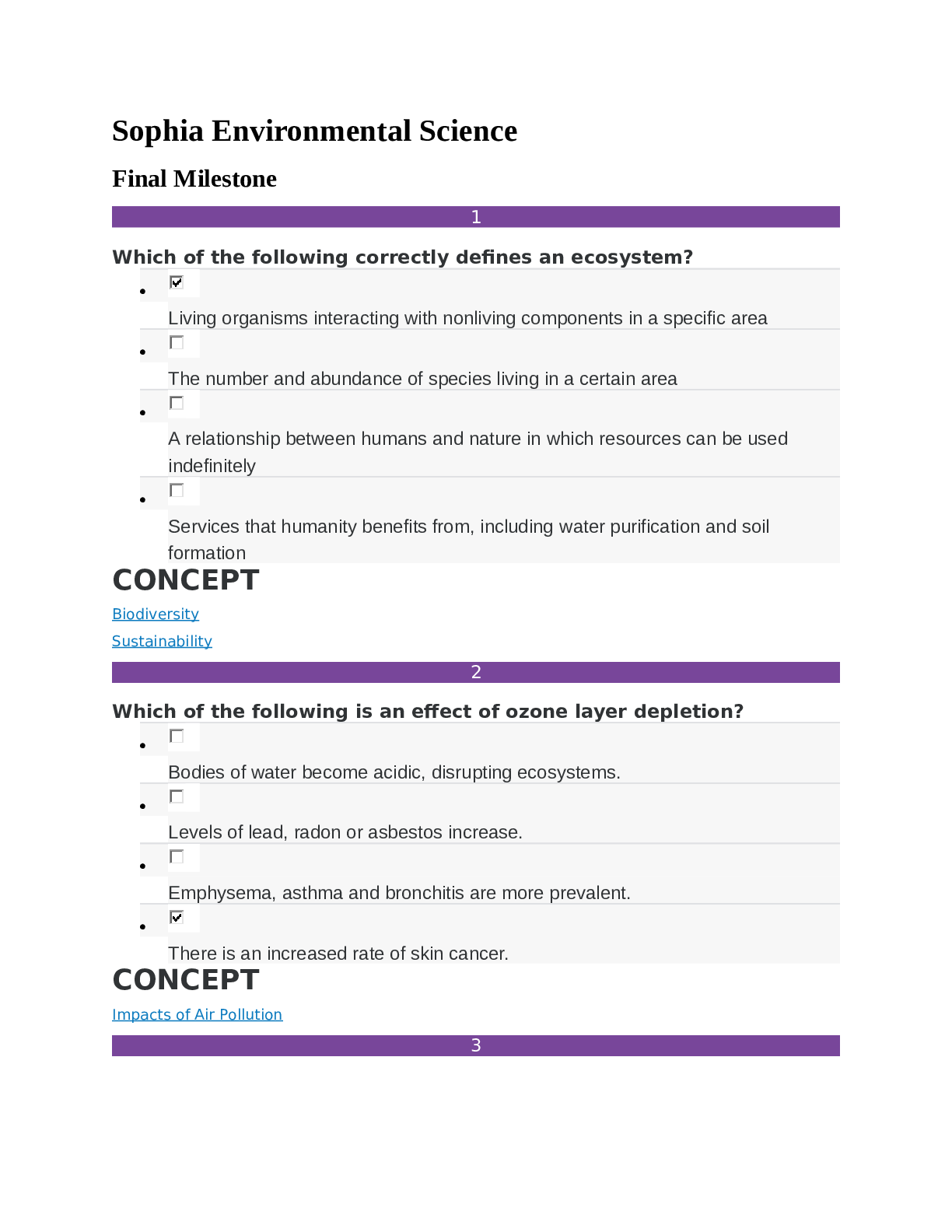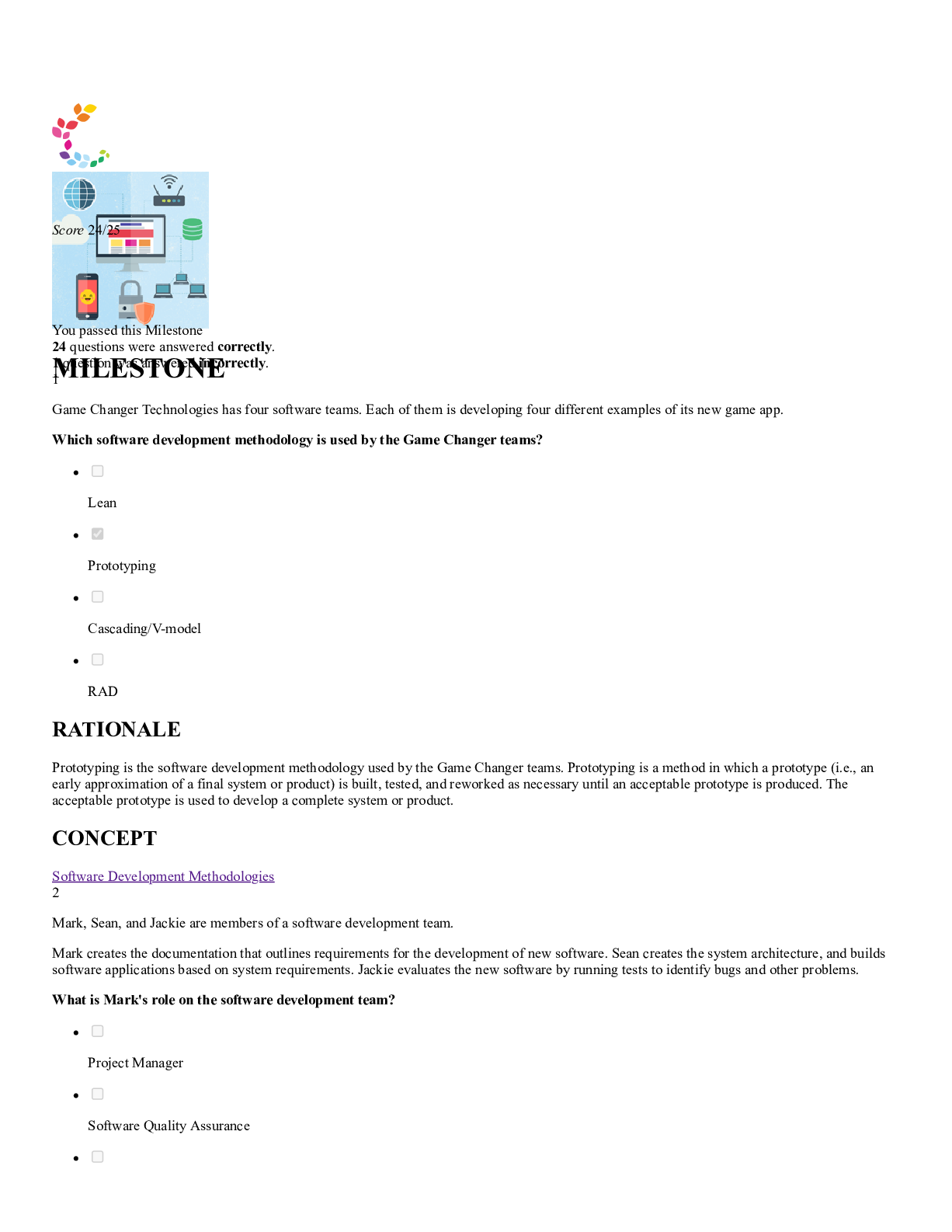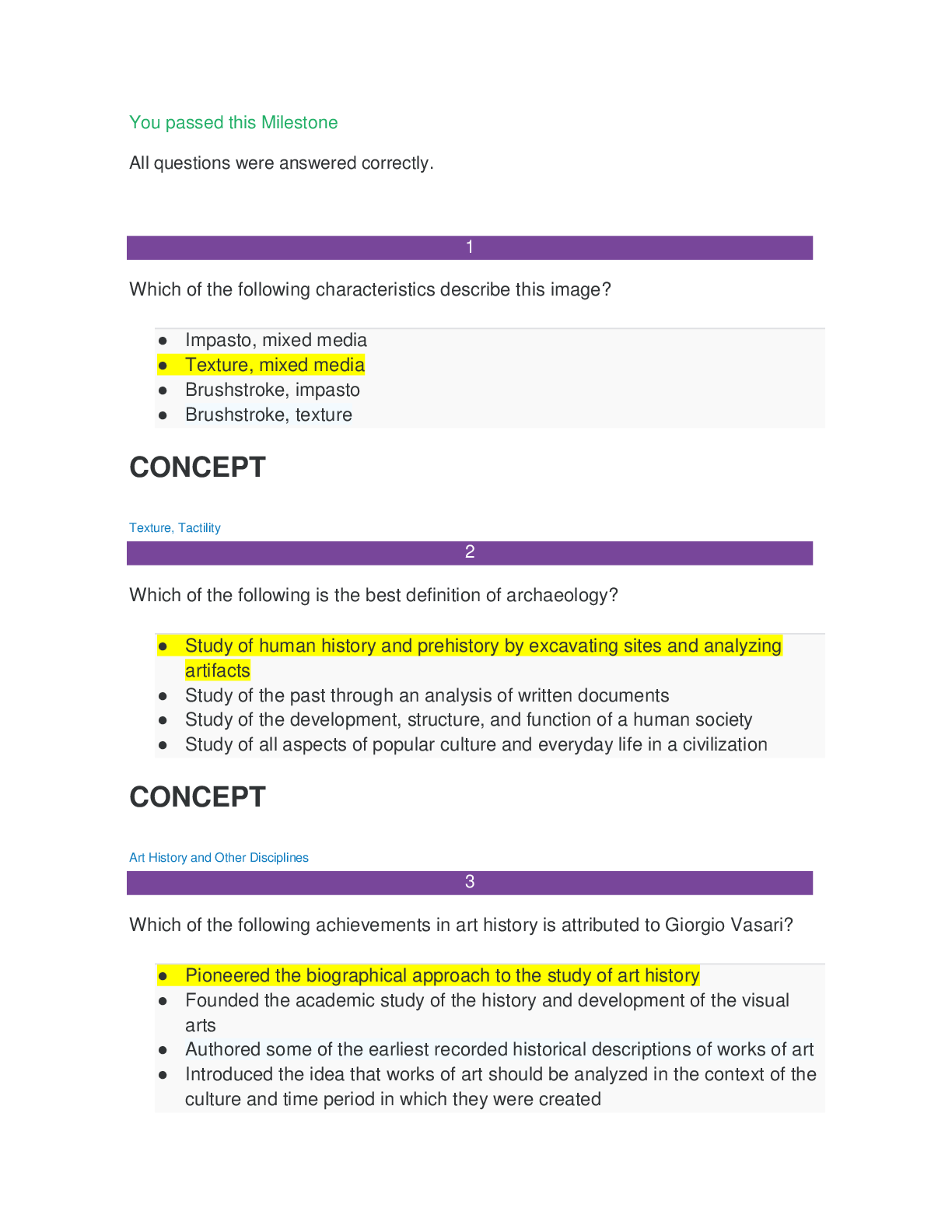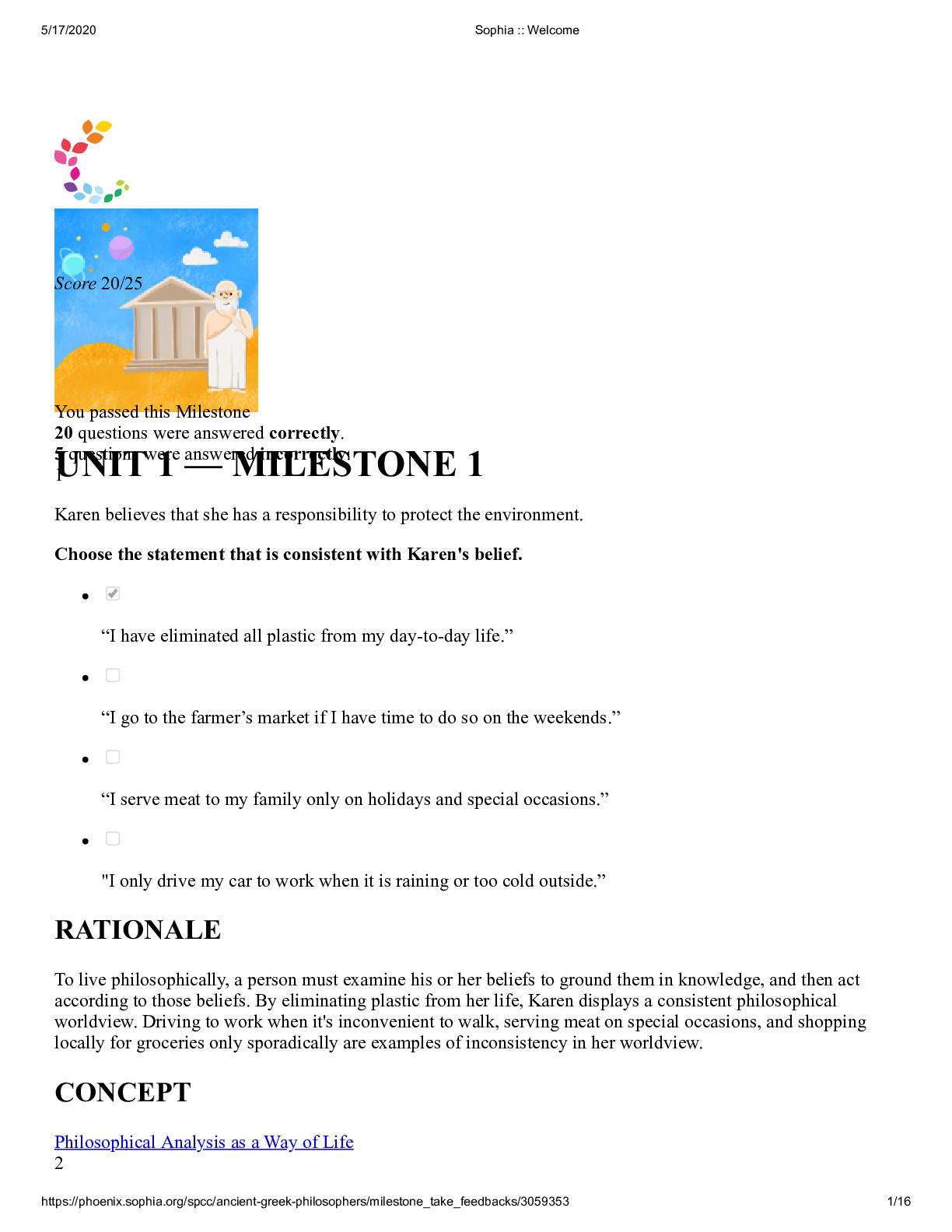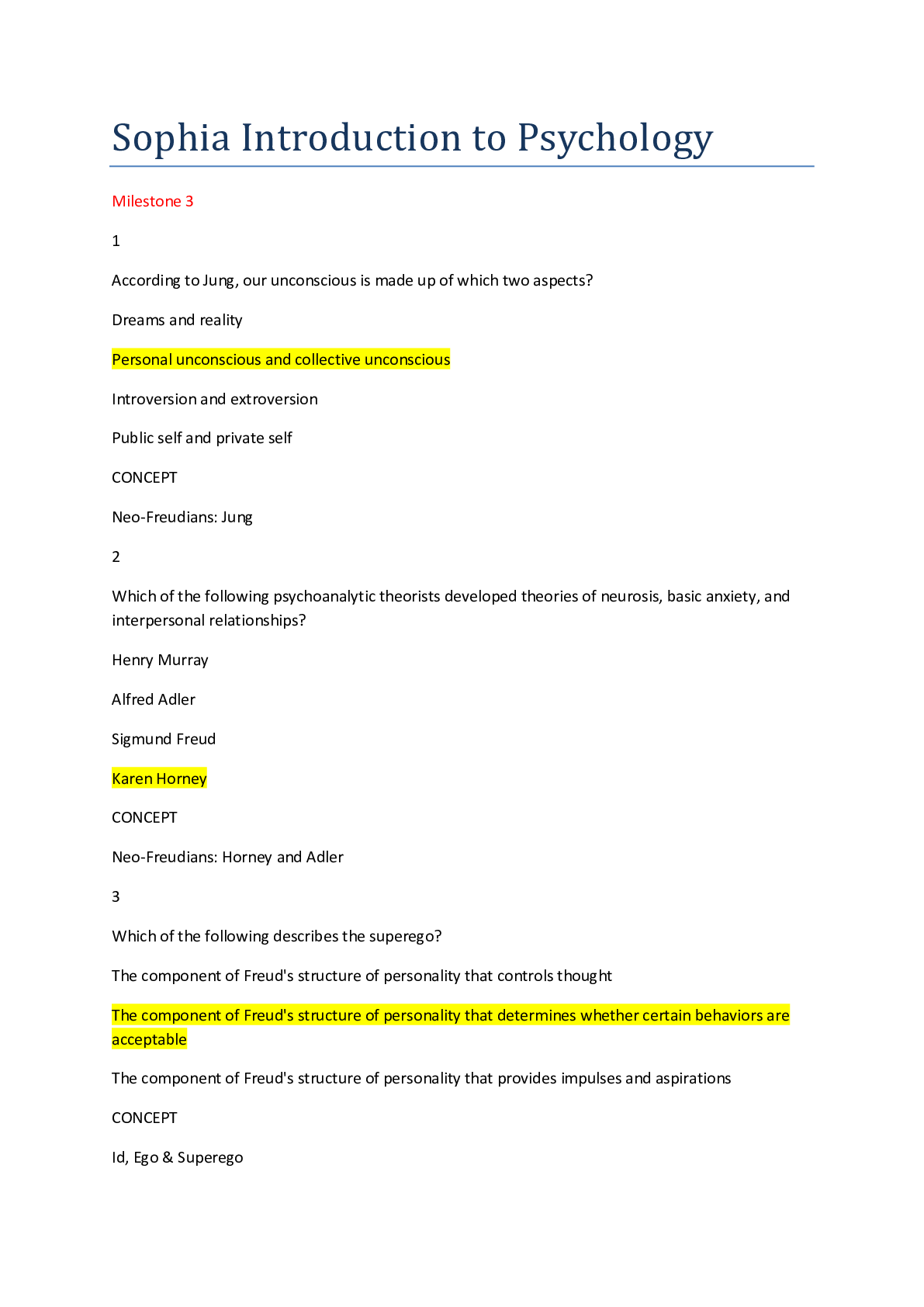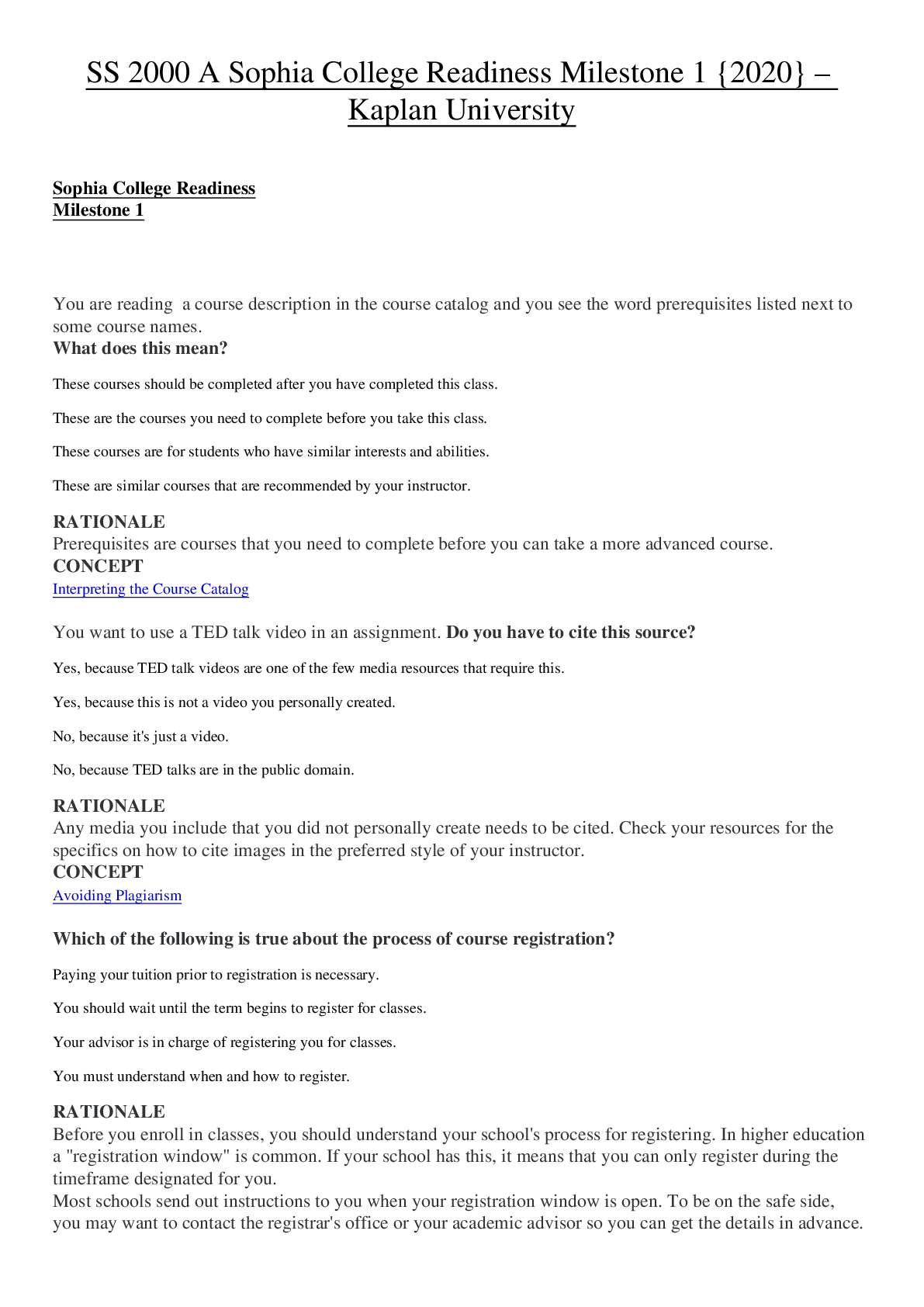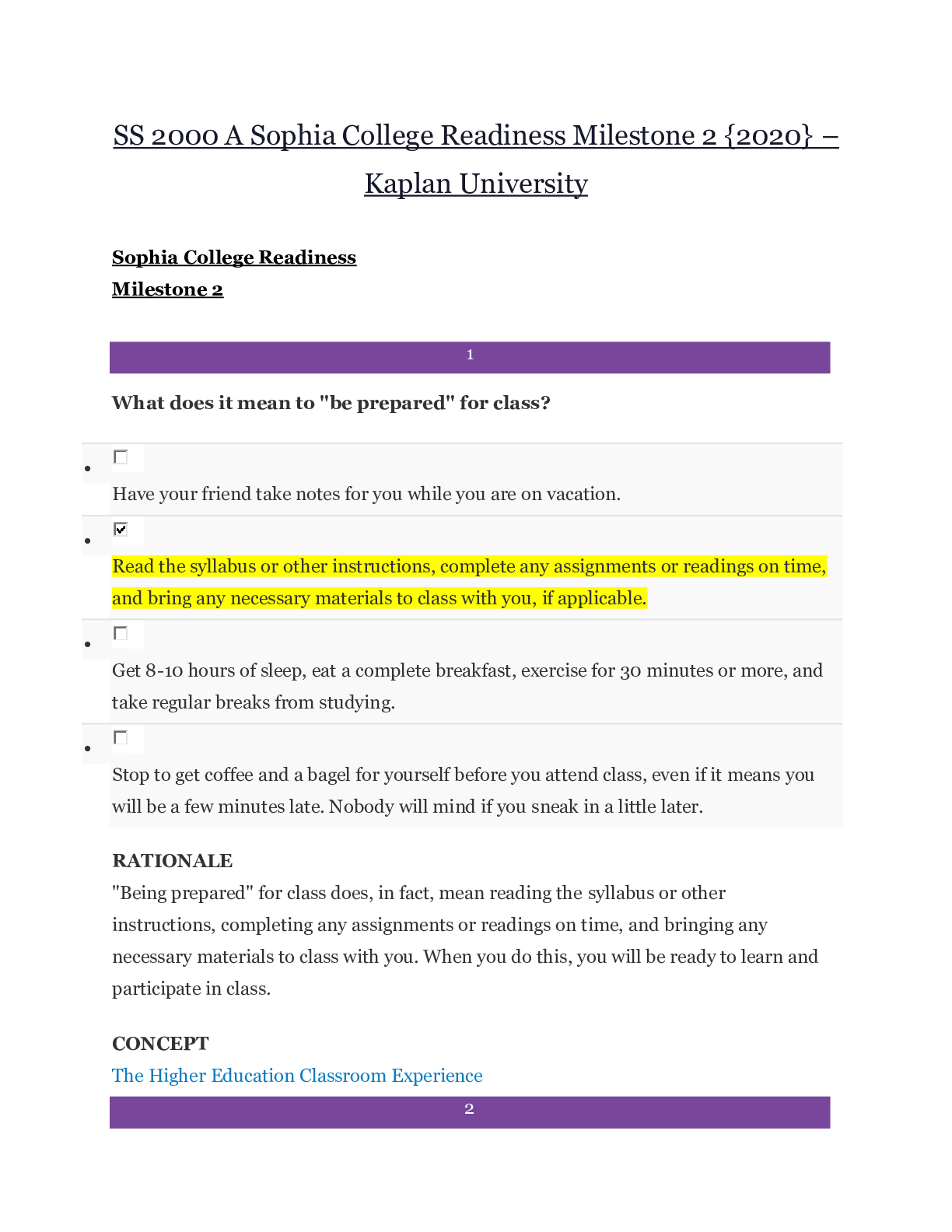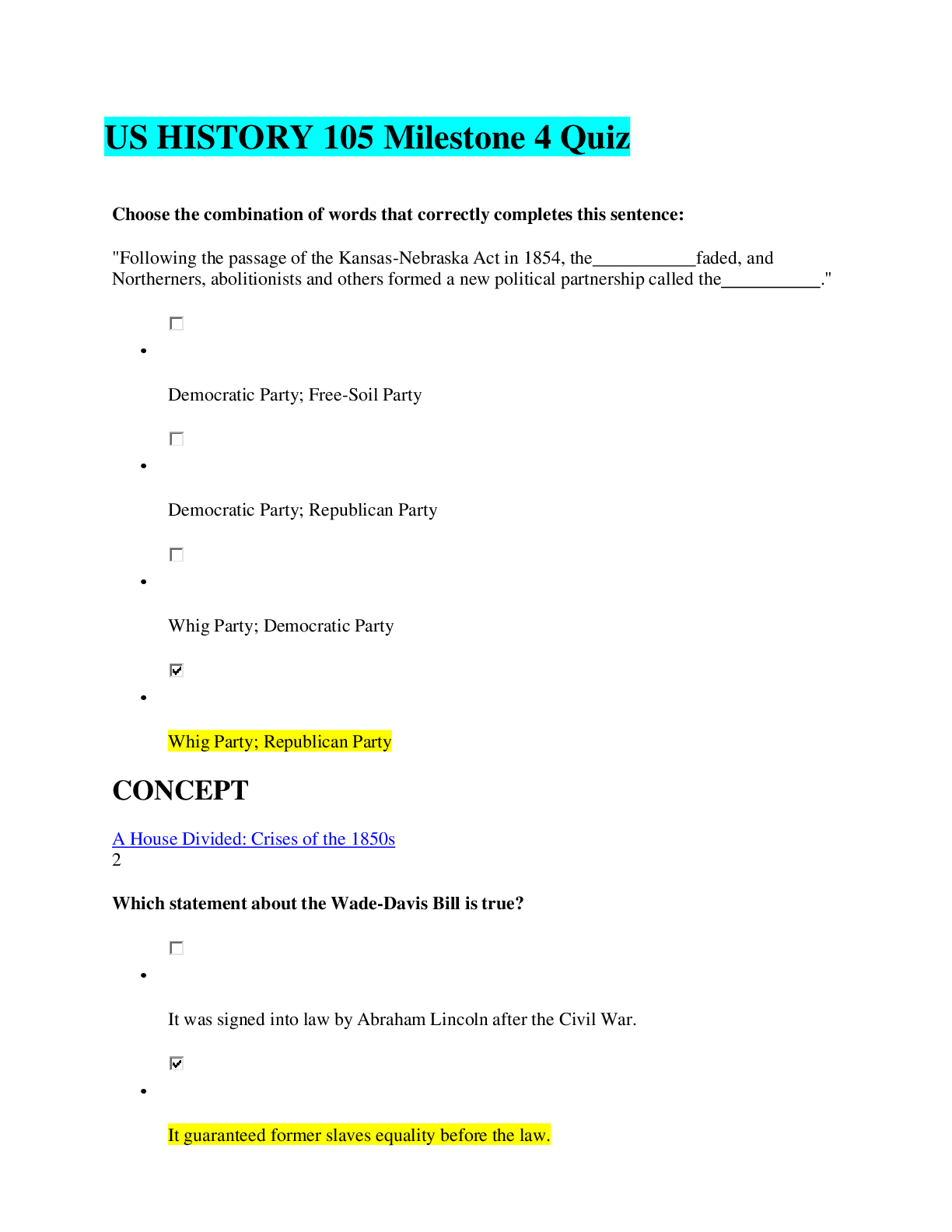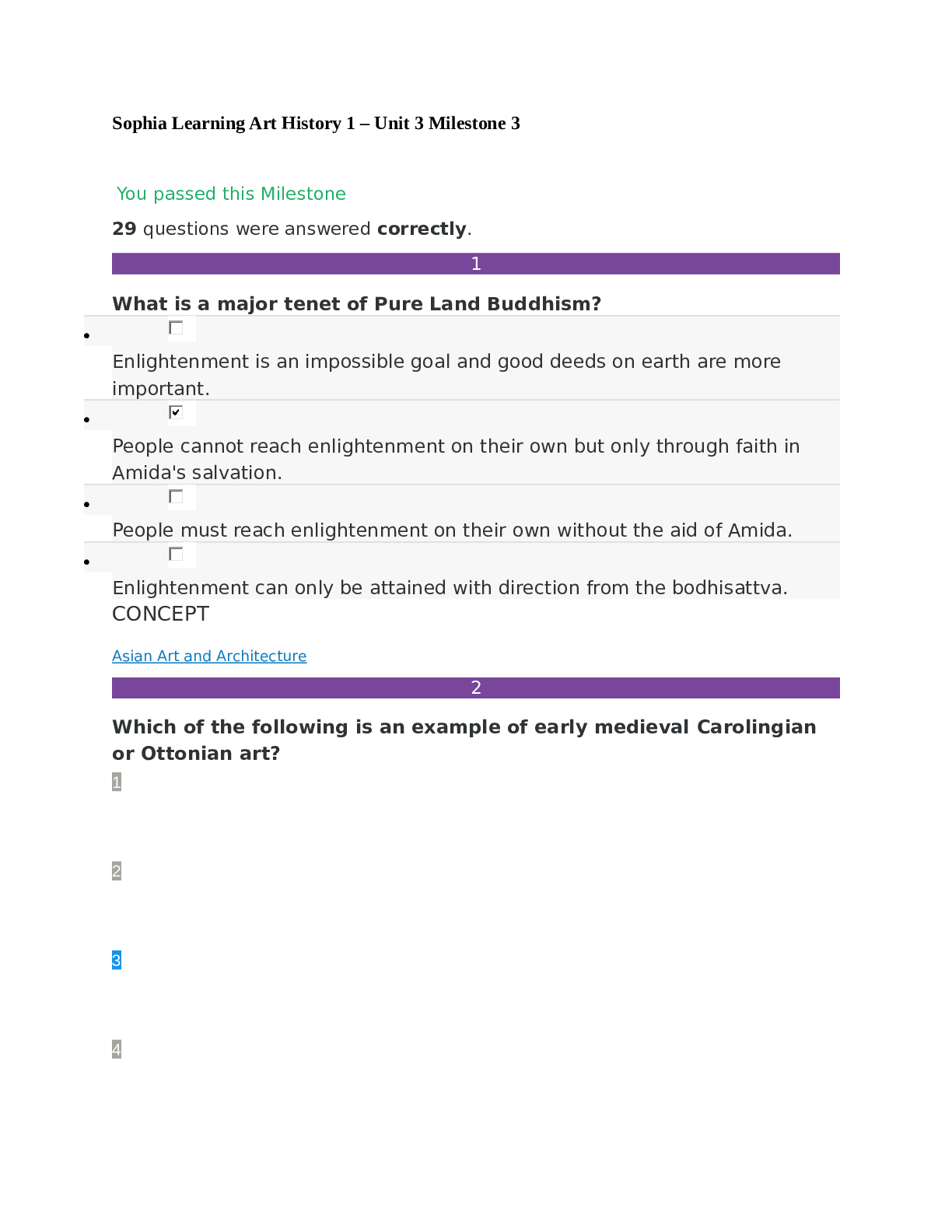Art > SOPHIA Milestone > ART HISTORY I - SOPHIA LEARNING - UNIT 1 PRACTICE MILESTONE (All)
ART HISTORY I - SOPHIA LEARNING - UNIT 1 PRACTICE MILESTONE
Document Content and Description Below
Art History I PRACTICE MILESTONE 1 Are you ready to take Milestone 1? Taking this practice test is a stress-free way to find out if you are ready for the Milestone 1 assessment. You can print it o... ut and test yourself to discover your strengths and weaknesses. The answer key is at the end of this Practice Milestone. QUESTION 1 Which of the following achievements in art history is attributed to Pliny the Elder? A. First to take a biographical approach to art history B. First to see "Dark Ages" as period of artistic decline C. First to include historical descriptions of art D. First to associate art with its cultural context QUESTION 2 A(n) __________ who is exceptionally talented at creating works of aesthetic value is known as a genius. A. anthropologist B. historian C. scholar D. artist QUESTION 3 A work of outstanding skill or artistry, such as Michelangelo’s “Pieta," is considered a __________. A. work of art B. masterpiece C. original creation D. style QUESTION 4 Which of the following definitions applies to the word “patronage?” A. A store or showroom where works of art are sold B. Those works of art considered to be most important, usually those studied in art history survey classes C. The act of financially supporting the arts D. The economic circulation of works of art © 2018 Sophia Learning, LLCArt History I PRACTICE MILESTONE 1 QUESTION 5 Which of the words below describes the list of the most important works of art that everyone who takes an art history class should know? A. Patronage B. Connoisseurship C. Oeuvre D. Canon QUESTION 6 Which of the following would best fit within the realm of art history rather than art appreciation? A. Explaining how the Rococo style of artwork emerged from the Baroque period B. Using formal analysis to explain to someone the physical qualities of a piece of sculpture C. Identifying a painting as Impressionist D. Identifying a work of art from Ancient Egypt based on its physical characteristics QUESTION 7 Match each of the following terms to the situation in which they would best apply. Items to answer: 1. Comparison and contrast A. The use of complementary color in Van Gogh’s paintings 2. Formal analysis B. The difference between the use of perspective in Japanese prints and Renaissance painting 3. Context C. The elements of Picasso’s biography that contributed to his greatness as an artist D. The social and historic situation surrounding the development of still life QUESTION 8 Which of the following is the correct definition of “visual culture?” A. The study of the past, particularly through the analysis of written documents B. The study of humans and their ancestors, in different time periods and locations, with emphasis on adaptation to physical environment, culture, and interpersonal relationships C. The set of ideas and values developed through exposure to the same broadcast, print, and Internet media outlets D. A field of academic study that emphasizes the cultural meaning of a work of art rather than its aesthetic value © 2018 Sophia Learning, LLCArt History I PRACTICE MILESTONE 1 QUESTION 9 Match each term below to its corresponding definition. Items to answer: 1. Anthropology A. The study of human history and prehistory through the excavation of sites and analysis of artifacts 2. Archaeology B. The study of all aspects of cultural production; in particular, popular culture or everyday life 3. Sociology C. The study of the development, structure, and functioning of human society D. The study of humans and their ancestors in different time periods and locations QUESTION 10 _________ describes a collection of people with different ethnic backgrounds and beliefs. A. Diversity B. Religion C. Politics D. Society QUESTION 11 Which of the following is NOT a career that requires knowledge of art history? A. Figure drawing instructor B. Real estate agent C. Set designer for historical films D. Architect © 2018 Sophia Learning, LLCArt History I PRACTICE MILESTONE 1 QUESTION 12 Which of the following is an example of a three-dimensional work of art? A. A painting B. A sketch C. A gestural drawing D. A sculpture QUESTION 13 Select the FALSE statement regarding the above chalk sketch by Leonardo da Vinci. A. It is considered a work of art. B. It is unanimously accepted as a masterpiece by art historians. C. New art history can be applied to understand it. D. It is an example of traditional media. QUESTION 14 Which of the following is the correct definition for “encaustic?” A. A type of painting that uses beeswax as a binder B. A type of paint that uses egg yolk as a binder C. A type of paint developed in the late 20th century that uses synthetic polymers as binders D. A type of paint in which pigment is temporarily suspended in water © 2018 Sophia Learning, LLCArt History I PRACTICE MILESTONE 1 QUESTION 15 Which of the following is NOT a type of medium commonly associated with drawing? A. Pen and ink B. Charcoal C. Oil paint D. Pastel QUESTION 16 © 2018 Sophia Learning, LLCArt History I PRACTICE MILESTONE 1 Which criteria are displayed in this work of art? Check yes if it is displayed, and check no if it is not displayed. Yes No Assemblage Modeling Carving QUESTION 17 Which of the following applies to a work of art or architecture which has site specificity? A. It is impossible to move or reconstruct the art or architecture in another location. B. It has no relationship to its location. C. It is constructed to contrast with a location. D. It can be moved to or reconstructed in another location. QUESTION 18 Which three of the following terms are forms of experimental artistic media? A. Photography B. Body art C. Drawing D. Arte povera E. Land art F. Printmaking QUESTION 19 Which of the following is NOT an example of a theme which unites artistic practice in using new media? A. The Art System B. Video Game Animation C. Scientific and Industrial Research D. Political/Cultural Media Activism © 2018 Sophia Learning, LLCArt History I PRACTICE MILESTONE 1 QUESTION 20 Which criteria are displayed in this work of art? Check yes if it is displayed, and check no if it is not displayed. Yes No Illusionism Representation Abstraction QUESTION 21 Select one quality found in this painting by Frida Kahlo: A. Relief B. Geometric Shapes C. Foreground D. Middle ground © 2018 Sophia Learning, LLCArt History I PRACTICE MILESTONE 1 QUESTION 22 Which criteria are displayed in this work of art? Check yes if it is displayed, and check no if it is not displayed. Yes No Saturation of color Use of complementary colors Expressive line QUESTION 23 Match these works of art to the type of line they best represent. © 2018 Sophia Learning, LLCArt History I PRACTICE MILESTONE 1 1. 2. 3. A. Contour line B. Parallel line C. Expressive line D. Gestural line © 2018 Sophia Learning, LLCArt History I PRACTICE MILESTONE 1 QUESTION 24 Which criteria are displayed in this work of art? Check yes if it is displayed, and check no if it is not displayed. Yes No Picture plane is emphasized Use of curvilinear lines Use of complementary color © 2018 Sophia Learning, LLCArt History I PRACTICE MILESTONE 1 QUESTION 25 Match each of the following terms with the corresponding definition. Items to answer: 1. Brushstroke A. Having to do with the sense of touch 2. Mixed media B. The thick buildup of paint, usually oil or acrylic, on the surface of a painting 3. Tactile C. Any type of art that combines different artistic media D. The visible mark of the paintbrush on the surface of a painting QUESTION 26 Which of the following formal elements are present in this image? A. Bilateral symmetry and balance B. Asymmetry and dynamism C. Asymmetry and balance D. Bilateral symmetry and dynamism QUESTION 27 Select the technique Howard Finster used to create the illusion of depth in this work. A. Modeling B. Linear perspective C. Atmospheric perspective D. Positioning © 2018 Sophia Learning, LLCArt History I PRACTICE MILESTONE 1 QUESTION 28 The use of parallel lines, as indicated by the purple arrow in the image above, used to add shadow and depth to a work of art is called __________. A. Cross-hatching B. Hatching C. Modeling 2-D D. Negative space QUESTION 29 Works of art sharing a Regional Style share what type of characteristics? A. Subject matter and physical characteristics unique to a specific artist B. Subject matter and materials common to an expression of emotion C. Subject matter or physical characteristics unique to a specific region D. Visual characteristics unique to a specific period in time © 2018 Sophia Learning, LLCArt History I [Show More]
Last updated: 1 year ago
Preview 1 out of 16 pages
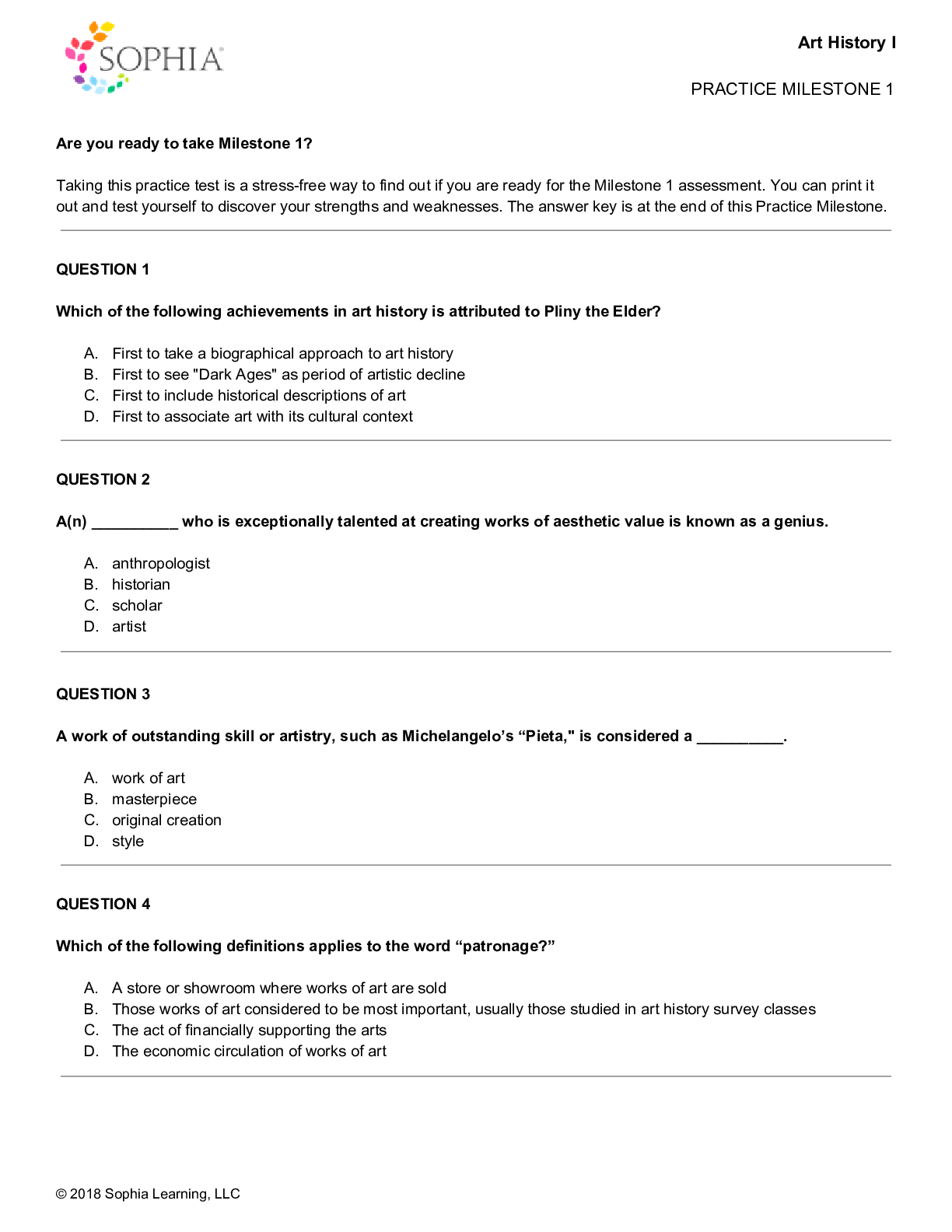
Reviews( 0 )
Document information
Connected school, study & course
About the document
Uploaded On
Jan 13, 2021
Number of pages
16
Written in
Additional information
This document has been written for:
Uploaded
Jan 13, 2021
Downloads
0
Views
123

